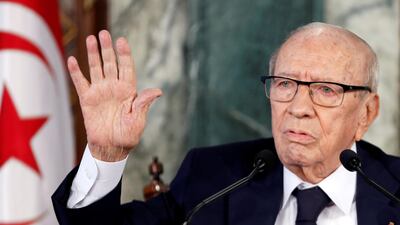Tunisia's president said on Saturday that he would not run for re-election in the November so that a younger leader can take control of the country.
"In all honesty, I don't think I will put myself forward," President Beji Caid Essebsi, 92, told the Nidaa Tounes party that he founded in 2012, adding it was time "to open the door to the youth".
His speech before thousands of members at the party's congress came several days after Abdelaziz Bouteflika, 82, the ailing leader of neighbouring Algeria, resigned in the face of huge protests ending two decades in power. The country's youth took to the streets to call for wide political change, forcing a change of power that will lead to the election of a new president.
Mr Essebsi, Tunisia's first democratically elected president, urged his party to overcome bitter internal divisions and to bring Prime Minister Youssef Chahed back into the fold.
Tensions have flared between Mr Chahed and Mr Essebsi's son, Hafedh Caid Essebsi, leading to the premier being sidelined from Nidaa Tounes and forming his own rival party, Tahia Tounes.
Mr Essebsi's secularist Nidaa Tounes won the 2014 elections and formed a coalition with the Islamist-inspired Ennahdha that lasted four years before the two parties split.
Presidential elections are due on November 17, after parliamentary elections that have been scheduled for October 6.
Tunisia, whose 2011 revolt toppled longtime dictator Zine El Abidine Ben Ali and sparked the Arab uprisings, has been hailed as a model of democratisation in the Arab world, but has faced economic woes and militant attacks.
None of the North African country's main political parties have yet announced their candidates for the presidential polls.

